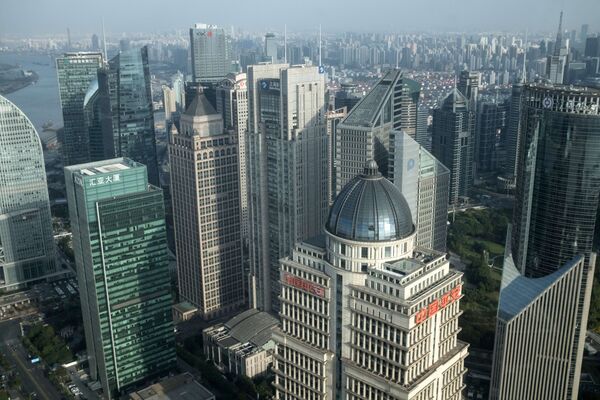Joe Biden has signalled that his Cabinet will not immediately undo President Donald Trump's tariff policy and technology industry challenge against China, as The New York Times and CNBC reported late last month.
However, it appears that Beijing is ready for any possible scenario, as it has adopted a “dual circulation” strategy to reduce its dependence on foreign markets, which was outlined by Ambassador Zhang Ming in his December op-ed for Euractiv. Citing complexities and volatility in the global economy, the ambassador referred to China's "new development paradigm with domestic circulation as the mainstay and domestic and international circulations reinforcing each other".
China's 'Dual Circulation' Strategy
Chinese President Xi Jinping announced the "dual circulation" concept in May, well before the 2020 US presidential election. Actually, China has never had illusions about the Trump or Biden administrations, according to Thomas Weir Pauken II, a Beijing-based US commentator specialising in Asia-Pacific Affairs and author of "US vs. China: From Trade War to Reciprocal Deal".
"Beijing is boosting domestic demand as a common sense approach", he says. "Many Western governments will march ahead on lockdowns to curb the coronavirus next year and the strict regulations on international travel, social distancing, closures of restaurants and non-essential shops will drag the US and European economies into a tailspin for the first half of the year".
In contrast, China’s economic rebound is real and is expected to continue to surge ahead going into 2021, the commentator points out, adding that the growing domestic consumption may compensate for the reduction in demand by international consumers.

Nevertheless, China’s trade surplus reached $75.42 billion in November 2020, up 21% from a year earlier, according to the General Administration of Customs' December report. This indicates that the global demand for the country's goods is growing amid the pandemic, The Wall Street Journal admitted last month. At the same time, the People's Republic's 1.4 billion-strong consumer market presents great opportunities, especially given that the country's middle class amounts to over 400 million people.
"In regards to so-called better cooperation between Biden and Beijing that’s not for certain and the Chinese no longer worry about US consumers driving China’s economic growth rates", Pauken explains. "President Trump’s trade wars have taught the Chinese that ‘localisation’ not globalisation will keep China’s strong and vibrant for its mid to long-term outlook. The ‘China First’ has a similar philosophy as Trump’s ‘America First’ except it’s in reverse".
In addition to this, the Chinese yuan has risen in value compared to the US dollar since it was believed that Biden would enter the White House, the author highlights, suggesting that "this demonstrates China stands prepared to move forward on ‘dual circulation’ as a stronger yuan will play a more crucial role".
Meanwhile, the Centre for Economics and Business Research (CEBR), one of the UK's leading economics consultancies, projected that the People's Republic will overtake the US as the world’s biggest economy by 2028. CEBR expects China to become "an upper-income economy during the current five-year plan period (2020-25)", according to Douglas McWilliams, the consultancy's deputy chairman, as quoted by The Guardian.
"Washington will be in a much weaker position to continue trade wars with Beijing and China will respond with ‘tit-for-tat’ actions", believes Pauken. "The US economy will be rocked by the dragging on of trade wars and it could take years to recover from it".
'The US is Heading to One-Party Rule'
The US political establishment is seemingly aware of the looming challenge: Foreign Affairs, a magazine published by the influential think tank the Council on Foreign Relations (CFR), predicted in late December that the US and China are entering "the sharpest phase" of a "superpower marathon".
Senior American politicians in both Trump and Biden's camps are calling for cracking down on China. Following the November election, the US mainstream media started talking about FBI and IRS inquiries into the president-elect's son, Hunter Biden, focusing on his dealings with Chinese businessmen. For its part, Axios broke a story about alleged Chinese spy Fang Fang and her ties with prominent Democrats, including a House lawmaker.
However, Pauken does not believe that this trend will last long: according to him, the so-called scrutiny of China will be temporary as "Big Business will eventually take charge of the media narrative and they will demand the media deliver ‘pro-China’ messaging to protect their business interests with China".

The Beijing-based commentator suggests that business interests will prevail over concerns that China can outperform the US in the not-so-distant future. Thus, for instance, the New York Stock Exchange (NYSE) recently scrapped its plan to delist three Chinese telecom firms – China Mobile, China Telecom, and China Unicom – regardless of Trump's November executive order banning US investments in Chinese firms owned or controlled by the country's military.
The Democrats are likely to continue collaboration with the People's Republic and the GOP will be unable to exert pressure on their political opponents, Pauken deems.
"If Democrats win both Senate seats [in Georgia] and take control of the Senate it’s 'game over' for the Republican Party", he says. "The Democrats claim they will be tough on China, but actions speak louder than words. Biden is just bluffing and it will backfire when Beijing keeps calling his bluffs. China will be the winner by default and it’s nothing to be proud of".
The American author elaborates that after winning the Georgia runoffs, the Dems will maintain control not only over the White House and the House of Representatives, but also over the Senate, which means that the US is heading to nothing short of a "one-party system".
"The US is headed for a non-democratic form of government", Pauken warns, expressing doubts that Biden won fair and square. "There will be a one-party rule with the Democrat Party in charge, while the US-based mainstream media will serve as the propaganda organs for the US government, Big Business and globalist elites".



